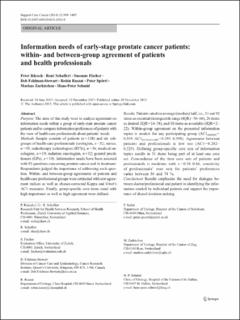Please use this identifier to cite or link to this item:
https://doi.org/10.21256/zhaw-3198Full metadata record
| DC Field | Value | Language |
|---|---|---|
| dc.contributor.author | Rüesch, Peter | - |
| dc.contributor.author | Schaffert, René | - |
| dc.contributor.author | Fischer, Susanne | - |
| dc.contributor.author | Feldman-Stewart, Deb | - |
| dc.contributor.author | Ruszat, Robin | - |
| dc.contributor.author | Spörri, Peter | - |
| dc.contributor.author | Zurkirchen, Markus | - |
| dc.contributor.author | Schmid, Hans-Peter | - |
| dc.date.accessioned | 2018-03-14T12:30:18Z | - |
| dc.date.available | 2018-03-14T12:30:18Z | - |
| dc.date.issued | 2014 | - |
| dc.identifier.issn | 0941-4355 | de_CH |
| dc.identifier.issn | 1433-7339 | de_CH |
| dc.identifier.uri | https://digitalcollection.zhaw.ch/handle/11475/3763 | - |
| dc.description | Erworben im Rahmen der Schweizer Nationallizenzen (http://www.nationallizenzen.ch) | de_CH |
| dc.description.abstract | Purpose: The aims of this study were to analyze agreement on information needs within a group of early-state prostate cancer patients and to compare information preferences of patients with the view of health-care professionals about patients’ needs. Methods: Sample consists of patients (n =128) and six subgroups of health-care professionals (urologists, n=32; nurses, n =95; radiotherapy technologists (RTTs), n =36; medical oncologists, n =19; radiation oncologists, n =12; general practitioners (GPs), n =10). Information needs have been assessed with 92 questions concerning prostate cancer and its treatment. Respondents judged the importance of addressing each question. Within- and between-group agreements of patients and health-care professional groups were estimatedwith raw agreement indices as well as chance-corrected Kappa and Gwet’s AC1 measures. Finally, group-specific core items rated with high importance as well as high agreement were defined. Results: Patients rated on average (median) half, i.e., 51 out 92 items as essential (interquartile range (IQR)=36-66), 26 items as desired (IQR=14-38), and 10 items as avoidable (IQR=2-22). Within-group agreement on the presented information topics is modest for any participating group (AC1patients=0.319; AC1professionals=0.295-0.398). Agreement between patients and professionals is low too (AC1=0.282-0.329). Defining group-specific core sets of information topics results in 51 items being part of at least one core set. Concordance of the item core sets of patients and professionals is moderate with κ=0.38-0.66, sensitivity of professionals’ core sets for patients’ preferences varies between 56 and 74%. Conclusions: Results emphasize the need for dialogue between doctor/professional and patient in identifying the information needed by individual patients and support the importance of shared decision making. | de_CH |
| dc.language.iso | en | de_CH |
| dc.publisher | Springer | de_CH |
| dc.relation.ispartof | Supportive Care in Cancer | de_CH |
| dc.rights | https://creativecommons.org/licenses/by-nc/3.0/ | de_CH |
| dc.subject | Prostate cancer | de_CH |
| dc.subject | Patient information need | de_CH |
| dc.subject | Shared decision making | de_CH |
| dc.subject | Patient–physician communication | de_CH |
| dc.subject | Health professionals’ opinion | de_CH |
| dc.subject.ddc | 616: Innere Medizin und Krankheiten | de_CH |
| dc.title | Information needs of early-stage prostate cancer patients : within- and between-group agreement of patients and health professionals | de_CH |
| dc.type | Beitrag in wissenschaftlicher Zeitschrift | de_CH |
| dcterms.type | Text | de_CH |
| zhaw.departement | Gesundheit | de_CH |
| zhaw.organisationalunit | Institut für Public Health (IPH) | de_CH |
| dc.identifier.doi | 10.1007/s00520-013-2052-8 | de_CH |
| dc.identifier.doi | 10.21256/zhaw-3198 | - |
| zhaw.funding.eu | No | de_CH |
| zhaw.issue | 4 | de_CH |
| zhaw.originated.zhaw | Yes | de_CH |
| zhaw.pages.end | 1007 | de_CH |
| zhaw.pages.start | 999 | de_CH |
| zhaw.publication.status | publishedVersion | de_CH |
| zhaw.volume | 22 | de_CH |
| zhaw.publication.review | Peer review (Publikation) | de_CH |
| Appears in collections: | Publikationen Gesundheit | |
Files in This Item:
| File | Description | Size | Format | |
|---|---|---|---|---|
| Rüesch2014_Article_InformationNeedsOfEarly-stageP.pdf | 282.1 kB | Adobe PDF |  View/Open |
Show simple item record
Rüesch, P., Schaffert, R., Fischer, S., Feldman-Stewart, D., Ruszat, R., Spörri, P., Zurkirchen, M., & Schmid, H.-P. (2014). Information needs of early-stage prostate cancer patients : within- and between-group agreement of patients and health professionals. Supportive Care in Cancer, 22(4), 999–1007. https://doi.org/10.1007/s00520-013-2052-8
Rüesch, P. et al. (2014) ‘Information needs of early-stage prostate cancer patients : within- and between-group agreement of patients and health professionals’, Supportive Care in Cancer, 22(4), pp. 999–1007. Available at: https://doi.org/10.1007/s00520-013-2052-8.
P. Rüesch et al., “Information needs of early-stage prostate cancer patients : within- and between-group agreement of patients and health professionals,” Supportive Care in Cancer, vol. 22, no. 4, pp. 999–1007, 2014, doi: 10.1007/s00520-013-2052-8.
RÜESCH, Peter, René SCHAFFERT, Susanne FISCHER, Deb FELDMAN-STEWART, Robin RUSZAT, Peter SPÖRRI, Markus ZURKIRCHEN und Hans-Peter SCHMID, 2014. Information needs of early-stage prostate cancer patients : within- and between-group agreement of patients and health professionals. Supportive Care in Cancer. 2014. Bd. 22, Nr. 4, S. 999–1007. DOI 10.1007/s00520-013-2052-8
Rüesch, Peter, René Schaffert, Susanne Fischer, Deb Feldman-Stewart, Robin Ruszat, Peter Spörri, Markus Zurkirchen, and Hans-Peter Schmid. 2014. “Information Needs of Early-Stage Prostate Cancer Patients : Within- and Between-Group Agreement of Patients and Health Professionals.” Supportive Care in Cancer 22 (4): 999–1007. https://doi.org/10.1007/s00520-013-2052-8.
Rüesch, Peter, et al. “Information Needs of Early-Stage Prostate Cancer Patients : Within- and Between-Group Agreement of Patients and Health Professionals.” Supportive Care in Cancer, vol. 22, no. 4, 2014, pp. 999–1007, https://doi.org/10.1007/s00520-013-2052-8.
Items in DSpace are protected by copyright, with all rights reserved, unless otherwise indicated.